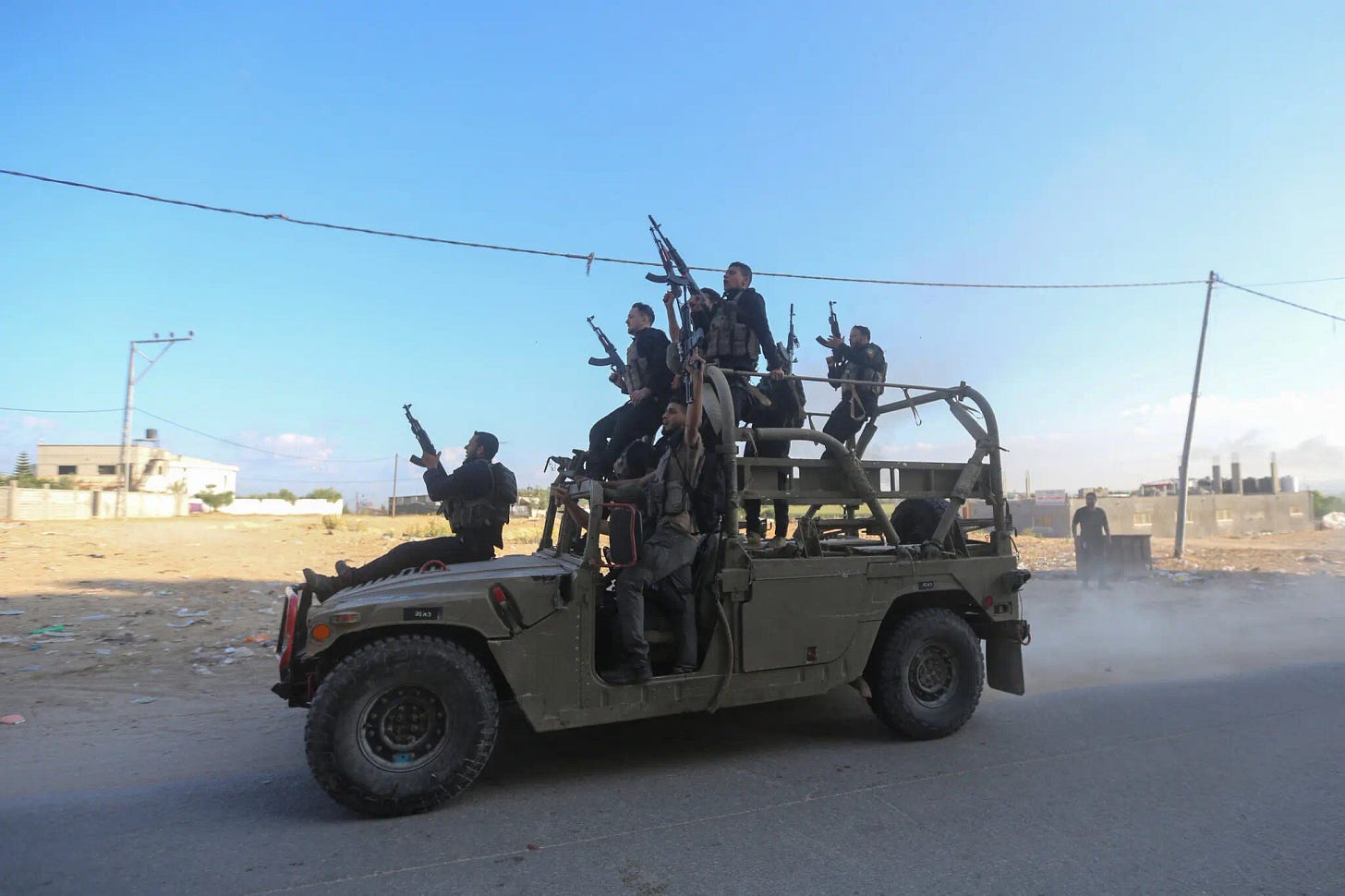Intelligence Failures and their Deadly Consequences
Intelligence failures are often the result of human factors such as information overload and cognitive bias. AI may offer solutions, but only if done right.
Israel knew of Hamas’ plans to attack for over a year before October 7, including extensive training exercises. Image source
On April 22, Israel’s military intelligence chief resigned over his department’s failure to anticipate or quickly respond to the October 7 Hamas attacks that killed 1,143 people. Since then, investigations have revealed that Israeli intelligence failures significantly contributed to the success of Hamas’ assault. In one example, Israeli authorities discovered a 40-page booklet detailing plans to conduct an attack over a year before the October 7 attacks but dismissed the plans as “aspirational.” In another instance, Israeli authorities disregarded reports of increased Hamas activity in May that included training exercises with tactics similar to those used on October 7.
Although technological advances have made intelligence gathering easier than ever, intelligence agencies increasingly struggle to process, analyze, and use intelligence to gain advantages over their adversaries, including non-state actors. These challenges result from information overload in the digital age and the cognitive bias of those conducting crucial analyses. However, new AI-based systems currently under development may be able to address some of these issues moving forward.
Intelligence and its role in conflict
Intelligence refers to structured information that helps leaders make decisions by conveying what is happening and projecting what will happen next. This may be strategic intelligence to guide political leaders in national-level policymaking or operational and tactical intelligence, which caters to military leaders. The underlying information is gathered using one or more sources and may fall into the categories of signals, human, and open-source intelligence.
Precise and actionable intelligence, especially in defensive contexts like in the case of Israel, can be vital in many conflict-related use cases, from predicting when war will break out to deciphering an adversary’s capabilities and assessing its intentions. Russia’s invasion of Ukraine in 2022 is one example of the strategic benefits of well-timed anticipatory intelligence. The U.S. publicly warned of a likely invasion months in advance and used this to convince allies of the threat. These warnings were consistent and largely accurate, including those issued in the days preceding the invasion. Although intelligence did not deter the Russian invasion, it likely paved the way for a swifter armed and diplomatic response.
The value of strategic intelligence is also demonstrated by intelligence failures, especially when faulty intelligence is used to justify offensive actions. Perhaps the most well-publicized intelligence failure of this kind was the 2003 U.S. invasion of Iraq, which was premised on false reports indicating that Iraq possessed weapons of mass destruction and had ties to terror groups such as al-Qaeda. The resulting nine-year conflict claimed the lives of around 4,500 American servicemembers and possibly more than one million Iraqis. In total, the war cost U.S. taxpayers at least two trillion dollars and irreparably damaged regional security, giving rise to both the Islamic State and a series of Iran-backed proxies that now dominate Iraq politically. Investigations have since revealed that the U.S. and U.K. intelligence communities made false assumptions and misleading claims that informed their decision to invade. The truth regarding these assumptions remains unclear even today.
U.S. intelligence produced satellite images of Russian troops massed on the Ukrainian border prior to Russia’s 2022 invasion. Image source
Unpacking intelligence failures
Intelligence failures are typically the result of multiple factors, such as sub-par information collection, flawed analytical judgments, and poor communication of findings to policymakers. Bureaucratic inefficiency is also a factor, including the lack of coordination between intelligence agencies that can result in contradictory reports, a lack of focus due to administrative workload, and a failure to heed warnings. For example, in 2002, operatives at the Australian Security Intelligence Organization (ASIO) ignored tips from a person who may have had information on the impending Bali attacks that killed over 200 people, including 88 Australians. This failure deprived ASIO and their counterparts of information that might have been used to foil the attacks. Similarly, a lack of information sharing between various U.S. agencies led to crucial blind spots before the 9/11 attacks.
Cognitive traps and biases are a common feature of many strategic failures. For example, experts at the Harvard Kennedy School’s Belfer Center indicate that Israel may have dismissed the booklet detailing the October 7 attack due to confirmation bias, as the plans appeared similar to a 2016 plan that Hamas did not act upon. The report also found that operatives tend to project their own mindset onto their target, resulting in further cognitive bias. In one example, the interviewers found that Israeli analysts frequently concluded that Hamas was primarily interested in governance rather than military action, based purely on their own assumptions. Preconceptions are a longstanding and institutional issue for intelligence communities. For example, in 1973, Israel was caught off guard when several Arab states initiated the Yom Kippur War. This surprise was in large part because Israeli analysts had several preconceptions about their neighbors – including that the Arab states wouldn’t initiate a war because they were not prepared, despite evidence to the contrary.
Cognitive bias is a persistent problem for Western intelligence agencies, including the Central Intelligence Agency (CIA). It is also found in non-western contests. For example, in 1999, the Indian army repeatedly ignored warnings of an imminent Pakistani attack amid a belief that Pakistan would be deterred by India’s nuclear weapons program, even despite Pakistan’s entry to the nuclear club a year prior. The resulting Kargil War surprised India, leading to high personnel losses.
Information overload is another contributing factor behind many intelligence failures. This may be due to operating in an information-dense environment, especially online, or being employed as a deliberate tactic by adversaries. Russia is a major proponent of manipulating the information environment to obscure the findings of foreign intelligence agencies. China is apparently learning from this tactic by deploying its own means to distract and confuse Western intelligence agencies.
The U.S. is one of many countries seeking to improve its intelligence capabilities to address new challenges. Some of these challenges include cyber warfare and the pivot from the global war on terror toward increased great power competition. This shift comes as countries like China innovate by enhancing their open-source intelligence-gathering capabilities. However, the ability to analyze intelligence will likely be the most important factor moving forward, with analysts in Western intelligence communities already exploring using artificial intelligence (AI) to filter data, test their judgments, and generate new inputs. Whether this technology can minimize the scope of future intelligence failures remains to be seen.
Big data and AI are playing a greater role in U.S. intelligence gathering and analysis. Image source
Conclusion
Although a revolution is underway in how intelligence is gathered and analyzed, this inadvertently opens the door for further intelligence failures. At a time of increased global great power competition, the stakes could not be higher. Addressing inherent challenges will require closer inter-agency communication and cooperation, carefully examining the processes by which intelligence is analyzed to root out bias, and ensuring policymakers possess the clarity needed to make informed decisions effectively.







Thank you Tarun, intelligence information comes in bunches, daily even hourly when involving National Defense, deciding what is critical and what is not can on occasion costs lives.
The points of this article are very valid, but the Oct. 7th events in Israel might not be the best example for that.
Although the investigation is still to be made to analyze and detail the multiple failures, we know that the military leadership got the relevant information and they chose to silence it and not communicate it to the political leadership. Many in Israel believe that it was intentionally to let the events happen (maybe assuming the magnitude won't be so large), but there are simpler explanations that are not necessarily conspiratorial.
1. All leadership, both military and political, were married to the conception that Hamas is both deterred and satisfied with what was the current balance. Meaning that the intelligence indications were not lost in the white noise created by the overflow of data, but intentionally ignored since it contradicted the conception, and it can be seen by the testimony of several sources from the military saying that they were providing detailed warnings and high officers ordering them to not speak of it anymore or they'll be disciplined. Another example is Halliva, the commander of the intelligence corps in the IDF, who by the way did not rise in ranks through the intelligence community, said in a conference in 2022 that he is predicting silence in the south for the next 5 years and that climate change is a greater threat on Israel than any other national security issue.
2. The military leadership was warned the night before and decided to not communicate this information to the political leadership. The question that arises from this is how much of the political turbulence that was happening in Israel impacted the military leadership decisions.
As I said, the investigation as to what happened and why has not been executed yet, but there are strong indications that the very valid points in this article about the intelligence challenges of our times are not necessarily the ones that manifest in the Oct. 7th event.